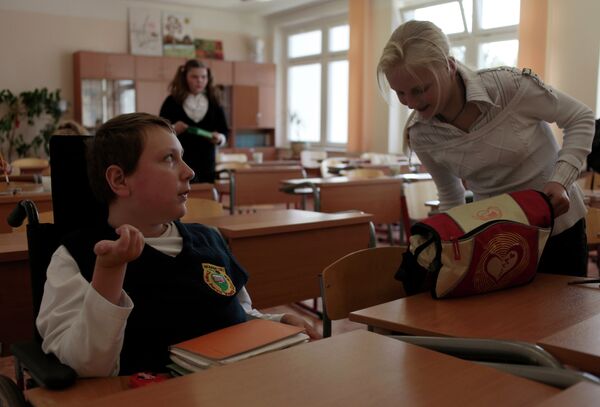Kirill Drozdkov, 12, knows every pothole and bump along his ten-minute route to school.
“Watch out for the curb, Mom,” he shouts as his mother navigates his wheelchair across the rocky pavement. “You really need to be more careful with me.”
The street is an obstacle course for the sixth grader, but he says he’s used to it.
He has to be.
Growing up with a disability in Russia is an epic struggle.
“I’ve been in a wheelchair my entire life, I don’t even think about it,” says Drozdkov. “Of course, it would be cool, very cool if my legs worked. But they don’t.”
At the tender age of 2, Drozdkov was diagnosed with Spinal Muscular Atrophy, a rare genetic disorder that weakens muscles and causes breathing and swallowing problems. The now wheelchair-bound 12-year-old attends public school outside of Moscow, a rare exception for a disabled child in Russia. He is the only student in a wheelchair in his class, or for that matter, in the region. There are only about 10 public schools in Moscow that allow students with disabilities to enroll.
Until 5 years ago, School No. 1161 was not one of them.
“His mom wanted him to go to a public school,” says Denise Roza, executive director of the advocacy group Perspectiva, a pioneer program for the disabled in Russia.
“She was very persistent and adamant about her son attending regular school,” says Roza. “It is not easy to challenge the authorities in Russia, but she did it.”
Now at the entrance of the school, a sign reads: “This school is for everyone,” beside those words: an image of a wheelchair.
In the Soviet Union, a lack of state support and public awareness meant that most disabled people were confined to their homes with little, if any, contact with the outside world.
Things have slowly improved for the estimated 13 million Russians living with disabilities. The collapse of the Soviet system meant non-governmental organizations and advocacy groups, like Perspektiva, were free to organize, and press for peoples’ rights.
“Life is getting better for us,” says Valentina Drozdkova, 47, as she helps feed her son. “When I was a child in the Soviet Union, we never saw kids in wheelchairs. We didn’t even know they existed.”
The Kremlin claims to recognize how deep and broad the problem is.
“When a disabled person can't go to the store, get easily on a plane or train, visit a museum, gym or cinema, or get a decent education, it's not just indifference or carelessness, it's a direct violation of the Constitution,” President Dmitry Medvedev said in a speech last year.
Under Medvedev, Russia signed a UN convention on disability rights. It promised to make Sochi a model of accessibility when the city hosts the 2014 Winter Olympics. There are also new programs and services, mainly in Moscow. In the past year, the Russian Ministry of Education decided to open up dozens of new centers at existing public and private universities around the country to help them integrate students with disabilities. It’s also now possible, for example, for a disabled Muscovite to call a special taxi.
Yet to date, there is almost no access to public transportation and even Russian apartments are rarely big enough for wheelchairs.
“Moscow is not a place for disabled people,” says Yevgeny Lilyin, chief rehabilitation expert of the Ministry of Health Care and Social Development in Russia.
“Ramps in the metro are supposed to have an angle of less than 12 degrees, but it is more than 45. Anyone that tries to use the ramp, becomes disabled themselves,” he says.
At School No.1161, Drozdkov has his own designated entrance. The school doesn’t have an elevator, but Drozdkov has a special power lift allowing him to climb from the first floor to the fifth. His mother and peers are beside him throughout the school day, assisting him in and out of the classroom.
“It is very sad to see a person in a wheelchair,” says Anastasia Korobova, 12, who sits beside Drozdkov in art class. “I try to help him out during class when he has to open his book, I do it for him.”
“Teachers don’t seem to have much enthusiasm for helping him,” Korobova added. Drozdkov’s mother, standing beside the student, interrupted, saying: “Why would they? He is just like everyone else.”
MOSCOW, October 7 (RIA Novosti, Diana Markosian)

